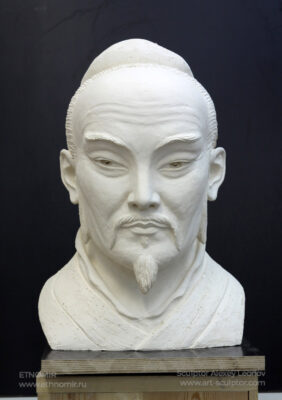Mencius. 2012
Author: Alexey Leonov
Material: Шамот
Location: КОЦ "ЭТНОМИР"
“The most valuable thing in the country is the people,
then power follows
and the ruler has the least value “.
Mencius
371 BC – 289 BC
Chinese philosopher, representative of Confucian tradition. He fully developed the teachings of Confucius about philanthropy and duty. The teachings of Mencius were widely used in the system of neo-Confucianism.
Essentially, Chinese philosophy is mainly aimed at helping people become saints-perfect-wise. Since Confucius did not detail his views on human nature, shortly after his death, a heated debate arose within the Confucian tradition about whether a person is originally good or evil by nature. Mencius, who represented the “idealistic wing,” claimed that man was originally kind by nature. Everyone can achieve the state of a sage. However, for this it is necessary to overcome a long and thorny spiritual path. In his views on man, he emphasized not only the ability to remake human nature, but emphasized the active transformative role of human activity.
The political views of Mencius basically boiled down to the need to encourage the princes to carry out humane rule in order to achieve the unification of the state.
He was a successor to Confucius, defended Confucianism from attacks from other schools of the time. He preached the idea of ”enlightened” despotism. The dogmas of Confucius about the predefined and invariable division of people into high and low, about the principles of management and related etiquette and ceremonies receive further development from Mencius. Accompanied by hundreds of his followers, Mencius traveled, preaching his doctrine, which played a large role in shaping the ideology of that period. Mencius was after Confucius the largest ideologist of Confucianism.
Proceedings. Mencius




